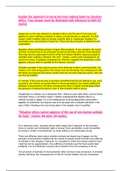Explain the approach to moral decision making taken by situation
ethics. Your answer must be illustrated with reference to theft (15
marks)
Agape love is the only absolute in situation ethics and this law of love has to be
applied to every individual situation in which a moral decision is required. For that
reason, theft is neither right nor wrong, it will be right in a particular situation if it
maximises love, and wrong if it does not. These are the principles of relativism and
pragmatism.
Situation ethics prioritises people not laws (Personalism). In any situation the needs
of those involved have to be assessed as well as the likely outcome of the decision.
This may also be expressed in terms of the four factors Fletcher requires people to
consider when making a decision: the ‘end’, ‘means’, motive and consequence, all
should be loving. In judging consequences, Fletcher suggests the application of the
agapeic calculus which is parallel to the hedonic calculus.
Possible example: If the purpose (end) of the theft was to feed a starving family; the
‘means’, the most loving option; the motive, love for the family; the consequence that
the family survived and the person stolen from did not miss what was stolen, then the
act may be justified.
In contrast, if the purpose was to possess something that did not belong to you, such
as picture; the means, an armed attack on those guarding it; the motive selfish (the
pleasure of possession); the likely consequence injury or death and denying others
the pleasure of seeing the picture, then in that situation theft is wrong.
“Situationism is a method, not a substantive ethic.” Where as some other ethics, such as Divine
Command Theory, is an ethical ‘system’, Fletcher emphasised that situation ethics is a
‘method’ focused on agape. It is in the middle ground of ethical approaches, being neither
legalistic nor antinomian, but requires rules to be set aside when a situation demands. In the
case of theft, if stealing is the most loving option in the situation, then it is justified.
“Situation ethics cannot approve of the use of non-human animals
for food.” Assess the view. (15 marks)
As a relativistic ethic, situation ethics might argue that it depends on the situation
since no actions are intrinsically right or wrong. Even cannibalism could be justified
as loving in certain circumstances, so meat eating is not intrinsically wrong.
There are differing views about whether animals are deserving of agape, but the
principle of personalism implies that the needs of people would override any suffering
of animals in this situation. However, in a situation in which the human need for food
could be met by vegetarianism, the suffering of animals used for food would need
justifying. It is not intuitively loving to kill an animal if it is not necessary to do so.
The provision of animals for food presently often involves mass production of animals
(factory farming); the consequences of this for human welfare may be considered





